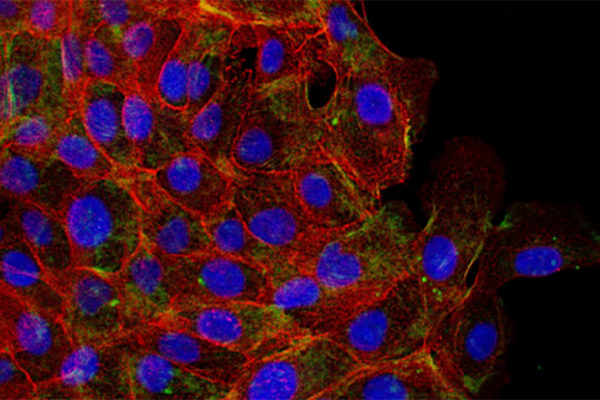Cells’ mechanical memory could hold clues to cancer metastasis
In the body, cells move around to form organs during development; to heal wounds; and when they metastasize from cancerous tumors. A mechanical engineer at Washington University in St. Louis found that cells remember the properties they had in their first environment for several days after they move to another in a process called mechanical memory.
Calcium carbonate: Tumor-fighting weapon
Engineers at Washington University in St. Louis use nanoparticle technology, applied to a drug found in most people’s medicine cabinets, to chemically alter a cancer tumor and stop its growth.
Discovery helps show how breast cancer spreads
School of Medicine researchers have discovered why breast cancer patients with dense breasts are more likely than others to develop aggressive tumors that spread. The finding opens the door to drug treatments that prevent metastasis. Shown are collagen fibers at the boundary of a tumor. Fibers that tend to be perpendicular to the tumor’s surface indicate a poor prognosis.
WUSTL licenses gene linked to cancer spread
Washington University in St. Louis has licensed to Castle Biosciences Inc. the exclusive use of a gene to detect the spread of cancer in melanoma patients. A link between the BAP1 gene and cancer metastasis was discovered by Washington University scientists J. William Harbour, MD, an ophthalmologic oncologist, and Anne Bowcock, PhD, a geneticist.
Gene identified for spread of deadly melanoma
Researchers at Washington University School of Medicine in St. Louis have identified a gene linked to the spread of melanoma of the eye. Although more research is needed, the researchers say the discovery is an important step in understanding why some tumors spread and others don’t, and they believe the findings could lead to more effective future treatments.
Bone drug suppresses wandering tumor cells in breast cancer patients
The bone-strengthening drug zoledronic acid (Zometa) can help fight metastatic breast cancer when given before surgery, suggests research at Washington University School of Medicine in St. Louis. When the drug was given along with chemotherapy for three months before breast cancer surgery, it reduced the number of women who had tumor cells in their bone marrow at the time of surgery.
Decoding tumor genomes reveals clues to spread of deadly breast cancer that affects younger women, African-Americans
Using powerful DNA sequencing technology to decode the genomes of cancer patients, scientists at the School of Medicine are getting an unprecedented look at the genetic basis of a highly lethal breast cancer that disproportionately affects younger women and those who are African-American, they report in the journal Nature.
Researchers defeat tumor cells by inhibiting healthy cells
Mice with Tax-induced leukemia/lymphoma develop large tumors and many areas of bone destruction, as shown in this X-ray.Defeating cancerous tumors by attacking healthy cells seems like an unusual strategy, but researchers at the School of Medicine have shown the strategy to be effective against leukemia/lymphoma in mice. The research group found that inhibiting normal bone-maintenance cells called osteoclasts not only prevented the mice’s cancer from spreading to their bones, it also slowed the growth of tumors in the body’s soft tissues.
Researchers defeat tumor cells by inhibiting healthy cells
Mice with Tax-induced leukemia/lymphoma develop large tumors and many areas of bone destruction, as shown in this X-ray.Defeating cancerous tumors by attacking healthy cells seems like an unusual strategy, but researchers at Washington University School of Medicine in St. Louis have shown the strategy to be effective against leukemia/lymphoma in mice. The research group found that inhibiting normal bone-maintenance cells called osteoclasts not only prevented the mice’s cancer from spreading to their bones, it also slowed the growth of tumors in the body’s soft tissues.


